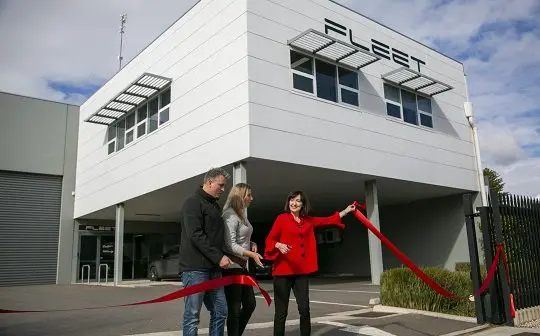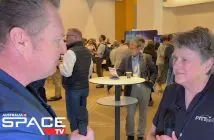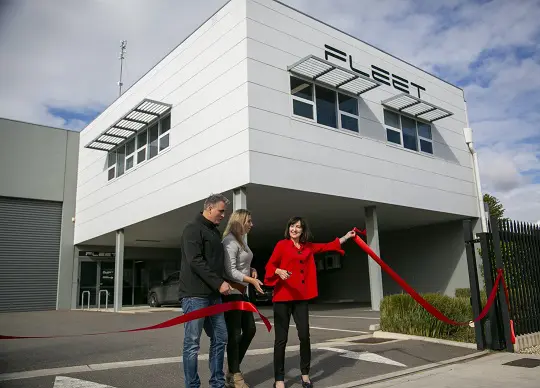
Adelaide’s Fleet Space has reflected on what it says is a year of sustained expansion and progress on all fronts in 2022.
“For an innovative, fast-growing company like ours, every year is full of events and developments, but 2022 really has been a landmark year for Fleet Space. Continued growth has seen our headcount exceed 100 people for the first time, including key new members joining our senior executive team; we’ve also expanded our reach with new offices on a global scale. Most importantly, we’ve entered into breakthrough commercial partnerships with our mineral exploration solution, ExoSphere, translating our space technological and engineering capabilities into viable real-world applications with huge global potential. Fleet Space has a future made in Australia and we’re incredibly proud of everything our team has achieved this year, which provides a fantastic platform for our ambitious plans in 2023 and beyond.” said Flavia Tata Nardini, CEO and Co-Founder, Fleet Space Technologies.
A Growing Global Constellation
In March, Fleet Space announced the launch of ExoSphere, its pioneering satellite-based solution offering a fast, sustainable mineral prospecting solution. Fleet’s sensors, the Geodes, are deployed in a survey area and leverage real-time passive seismic methods to ‘scan’ the land beneath in search of minerals. This is enabled through unobtrusive Ambient Noise Tomography (ANT) which listens to seismic waves. This is then rapidly processed and transmitted through Fleet’s low power satellite network. The end result is a low-impact, rich 3D survey.
ExoSphere uses the company’s satellite constellation of low earth orbit (LEO) small satellites, which was boosted with the successful launch of the next-generation Centauri 5 satellite on the SpaceX Falcon 9 Transporter-5 mission in May.
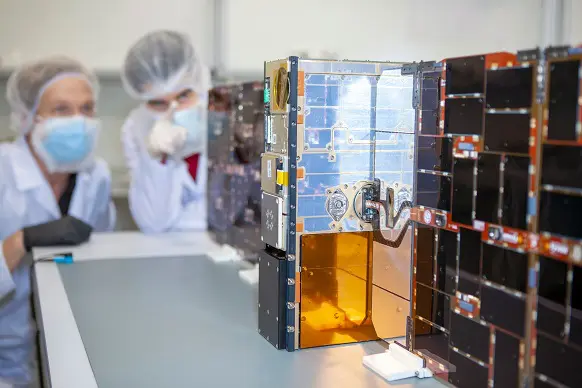
New Contracts and Partnerships
Since launching ExoSphere in March 2022, Fleet has signed contracts with over 20 customers based in Australia and North America. Fleet’s ExoSphere technology is contributing to solve the pressing global priority to decarbonise mobility and find more than $13trillion USD worth of minerals required for the energy transition to help meet global net zero priorities.
Within a few months of its launch, ExoSphere recorded its first deployments. August saw the completion of large-scale field deployments commissioned by Australia’s newest lithium miner, Core Lithium, at its Finniss Project in Australia’s Northern Territory. Core Lithium described the deployments as “an outstanding success” that had revealed a number of previously unknown targets – a major boost for lithium exploration. On 12 October, Fleet’s co-founder and CEO Flavia Tata Nardini and Gareth Manderson, CEO at Core Lithium, signed a 12-month contract that will deploy ExoSphere across Core’s tenements in the Northern Territory from May 2023.
Fleet also agreed its first pilot project for ExoSphere in North America. A deal concluded in September will see Talon Metals Corp using the system in exploration for high-grade nickel deposits in Minnesota and Michigan to supply the US battery supply chain. Talon’s CEO, Henri von Rooyen, said, “Fleet’s technology has the potential to deliver two tantalising results for geologists like our team of proven “nickel hunters”. Increased accuracy means less disturbance of the earth as compared to conventional exploration practices. Speed means a faster path to discovering the metallic minerals like nickel that society needs for the energy transition.”
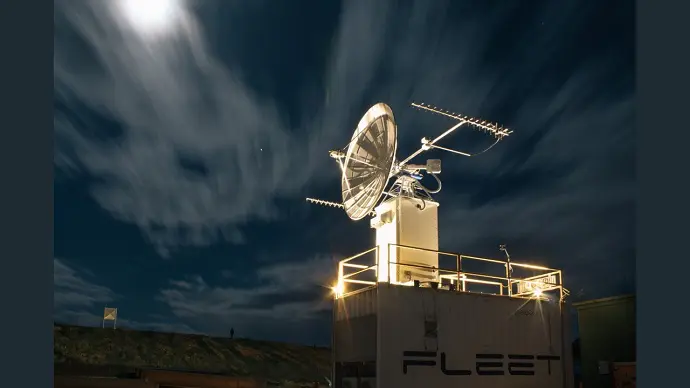
Exciting Innovative Prospects
Fleet Space continued to bring innovation to the forefront of the company. In September, Fleet introduced a new state-of-the-art 3D printer, the first of its kind in Australia, which uses a laser to weld thin layers of metal powder to produce highly complex metal parts; a technique known as direct metal printing (DMP). Fleet Space satellites incorporate highly advanced 3D printed components, including the S-Band Antenna RF Patches that receive and transmit signals between the constellation and portals and modems on the ground. This represents a significant boost to its capabilities, bringing manufacturing and new-product development fully in-house and paving the way for the next generation of fully 3D-printed Alpha satellites.
Image shows: Fleet Space employee, Chris Kemp quality checking the ‘freshly’ 3D printed metal patch antennas in house.
The 3D printer is the centrepiece of Fleet’s extended Adelaide HQ and manufacturing centre, which was formally opened in August by Susan Close MP, Deputy Premier of South Australia.
Image shows: Susan Close MP, cutting the ribbon with Co-founders, Matt Pearson and Flavia Tata Nardini on Fleet’s newly opened office, two doors down from their manufacturing innovation facility.
A Growing Team
Fleet’s commercial success has enabled it to create significant numbers of new jobs during 2022. From 47 people on 1 January, the total headcount has grown to 101 – an increase of 115% over the year – with a 68% rise between June and December alone. The growth seen here highlights the importance of Sovereign capability in Australia.
In addition to the newly grown team, Fleet Space has managed to secure high profile stakeholders to join the team. Among the senior personnel joining the company in 2022 are Federico Tata Nardini as Chief Finance Officer, Dr Gerrit Olivier as Director of Planetary Geophysics, Dr Hemant Chaurasia as Chief Product Officer, and Kevin Ramani as Chief Revenue Officer. All bring a wealth of scientific, technical and commercial knowledge to these crucial leadership roles.
Not to mention the Global presence, Fleet staff now operate all over the world. The company HQ remains based in Adelaide, with new business offices opened in Melbourne and Brisbane and internationally, Fleet has set up offices in Houston (TX) Ontario (Canada) and Santiago (Chile).
This growth, engagement and diversity offers talented Australians and returning Australians, from recent graduates to industry leaders, exciting jobs which supports the government’s pathway to 1.2M technology jobs by 2030.
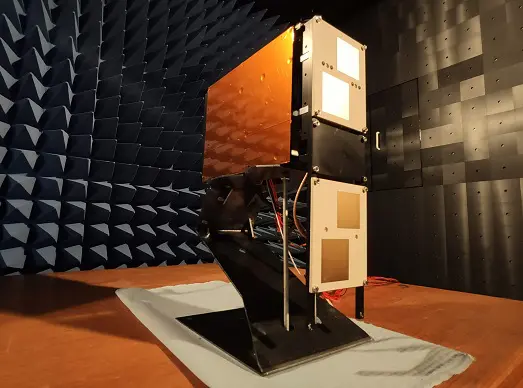
Industry Recognition
The year not only bought growth and innovation but succeeded highly in industry recognition. Fleet scooped three prestigious awards in 2022. In September, ExoSphere was named ‘Best In Class’ in the Product Design category at the Australian Good Design Awards, which celebrate the best new products and services on the Australian and international market.
In November, co-founder and CEO Flavia Tata Nardini was presented with the South Australian Pearcey Entrepreneur of the Year Award: the adjudicating committee was impressed by her leadership, tenacity and bravery, and described her as ‘a wonderful role model for young women entering the tech industry in South Australia and Australia’.
And at the South Australia ’40 under 40’ Awards in June, co-founder Matt Pearson took the VALO Sustainable Business Leaders prize, which recognises ‘an individual who has made visionary technologies that can sustainably enhance human experience and capacities’.
To The Stars
Last but not least, Fleet Space has made an increasing impact in the Australian and international media.
To name a few, Flavia Tata Nardini was among the speakers at Bloomberg’s New Economy Catalysts event in Singapore, discussing ‘The Race to Commercialise Space’: she also appeared in ‘South Australia – A New State of Mind’, a national integrated campaign for the State Government’s Department of the Premier and Cabinet (DPC).

